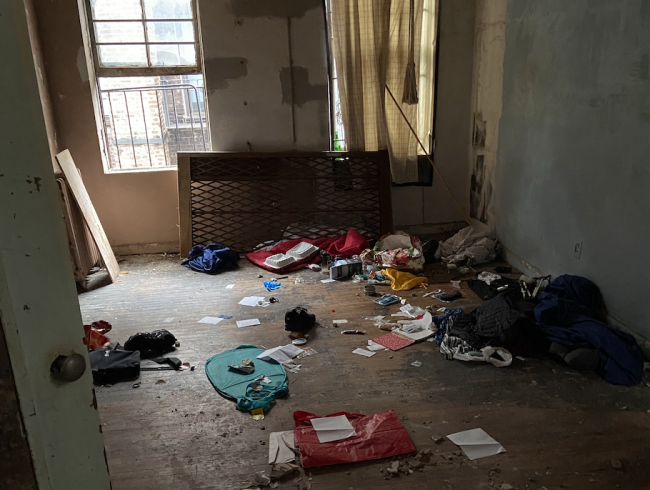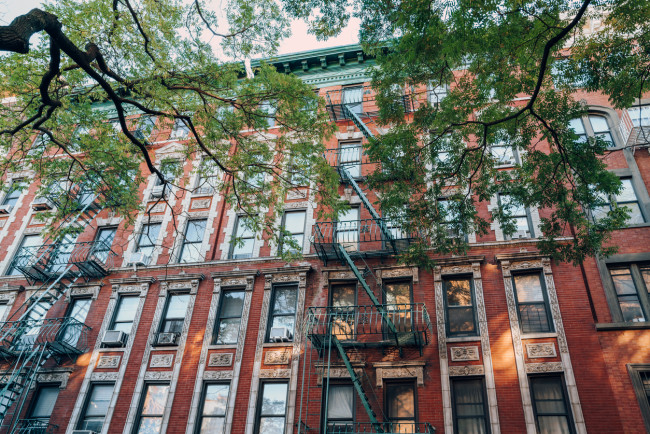Bad landlords could have their buildings seized and rehabbed under revived NYC program
- The updated Third Party Transfer program would allow the city to foreclose on distressed buildings and assign a manager
- A previous version of the TPT program was criticized for taking properties away from owners of color

New York City Council member Pierina Sanchez proposed a plan to reform the city's Third Party Transfer program.
Photo courtesy: Gerardo Romo/NYC Council Media Unit.
The New York City Council could revive a controversial program that allows the city to take properties away from landlords who fail to pay their taxes or make necessary repairs.
The council debated City Council member Pierina Sanchez’s bill to replace the Third Party Transfer (TPT) program on Monday, which in the past let the city foreclose on distressed properties in an effort to hold owners accountable for letting their buildings deteriorate. But the original program was heavily criticized for taking properties from small owners of color.
Under the bill, the city would still be able to foreclose on a distressed building and transfer it to a third-party company to manage it and make repairs. And the city would also be required to provide residents with more notice before placing a building into TPT, along with other reforms to the “disastrous,” past program, Sanchez said. (Gothamist first reported news of the bill.)
“We cannot leave New Yorkers to suffer living conditions dangerous to their health and safety,” Sanchez said at the Monday meeting. “We can focus on rescuing properties in the worst conditions while protecting and uplifting and even expanding home ownership and intergenerational wealth-building opportunities.”
What’s in the new program
The new TPT would apply to rental buildings and co-ops, including HDFCs, that are among the 500 properties with the most municipal debt and housing maintenance code violations. Under the bill, some owners could avoid a TPT in exchange for an agreement to pay off liens over a period of time, or for fixing dangerous building conditions.
Sanchez’s bill also requires the city to create an ombudsperson to assist owners of properties in distress, to notify the owner and every resident if their building could be foreclosed on, and would allow tenants to apply for ownership of their building.
Those reforms are meant to fix the “deeply flawed” TPT program, which ran from 1996 to 2019, when it was frozen after an outcry over its impact on communities of color, Sanchez said. A City Council audit found that half of the properties chosen for TPT were not actually distressed, and most were located in gentrifying communities across Brooklyn and the Bronx.
Under its past version, the city could also bring other properties that fell behind on their taxes into the TPT program if they were located on the same block as a distressed property in the program, even if those other buildings weren’t in disrepair. Sanchez’s bill eliminates that ability.
“This failure not only attacked homeownership but also perpetuated racial injustice,” Sanchez said. This legislation “ensures negligent landlords are held accountable, while addressing the longstanding housing crisis and ensuring all New Yorkers have access to safe, dignified housing,” she added.
Likely a long road ahead
But the city’s Department of Housing Preservation and Development and members of the public raised questions and objections over the new reforms.
Kim Darga, HPD’s deputy commissioner for development, said it might “not be feasible” for HPD to notify residents that their building might enter the TPT program as much as the bill requires, and said that the bill could “confuse and distress” residents or shareholders at buildings that might not necessarily enter TPT.
“HPD is fully in support of new legislation that improves the TPT program, but we cannot support the bill as currently written,” Darga said.
Others raised concerns that the bill would have the same impacts on communities of color. And the program may face a lawsuit if enacted, Gothamist reported.
Sanchez said that the council will take its time with the bill, which would have to be voted on by the committee and council before it could become a law.
“The city council is not interested in rushing this piece of legislation,” Sanchez said.
You Might Also Like




























